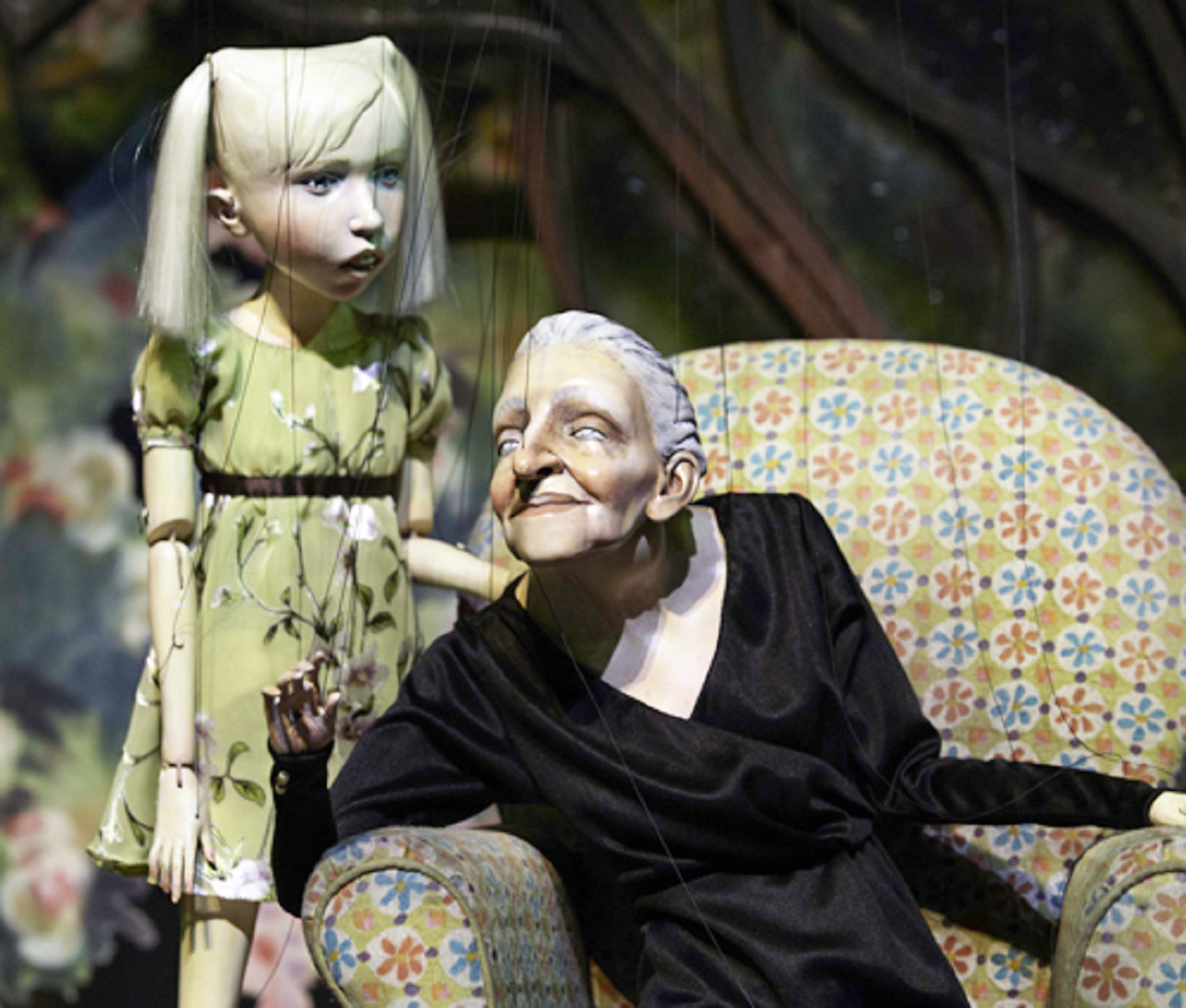Theater Review: “Penny Plain”

CAP UCLA
By Natalie Green
Jan. 21, 2014 1:28 p.m.
Dim blue lighting barely filters through tiled paneling, illuminating ever so slightly the miniature faces of half-seen marionettes. A platform, reminiscent of a structurally sound tree house, fills center stage. Two lone armchairs sit in front.
Soon, eerily futuristic music – a combination of electronic pitches and disco beats – begins to play, and various newscast-like voice-overs explain the current state of an apocalyptic America. The end of the world is now.
Ronnie Burkett, dressed in a black long sleeve shirt and dark jeans, discretely joins the stage with his cast of marionettes. From the upper level, Burkett navigates through a 100 minute, one-man performance, voicing a myriad of puppet characters that explore the influx of human emotions that color the end of civilization. In Macgowan Hall’s Little Theater, the Canadian performer made his Los Angeles debut with “Penny Plain,” the latest addition in Burkett’s own Theatre of Marionettes, formed in 1986.
Burkett, who wrote, performed and handcrafted the puppets used in the production, narrates an interconnected series of vignettes set in a boarding house, owned by the central character, Penny Plain. A blind, elderly woman, Ms. Plain chose to stop seeing long ago when she ceased to like what she saw. The story opens with Ms. Plain and her oldest companion, a talking dog named Geoffery, sitting in the two armchairs watching the news. Now that the world is literally going to the dogs, Geoffery tells Ms. Plain he wants to go out and experience it for himself. Ms. Plain poignantly feels her loss as she is left alone.
After Geoffery’s exit, the majority of Burkett’s story takes place in Ms. Plain’s drawing room, with characters such as a little girl, Tuppence, who pretends to be Ms. Plain’s new canine companion, Geppetto and Pinocchio, and a murderous editor, who all rotate through center stage. Each character’s story comes to life near or in Ms. Plain’s armchairs, as each is a boarding house renter or soon takes up residence there for the duration of the show.
As Ms. Plain feels at Geoffery’s abandonment, loss is a central theme for Burkett’s profound production, for at the end of the world, his cast is struggling with a universal concept: loneliness.
Minutes slip by, and the strings attached to Burkett’s handcrafted puppets are easily forgotten thanks to the human failings and desires he induces from each character. Burkett masterfully juxtaposes silence and speech as he hops from puppet to puppet, constantly rearranging his setup and rotating through identical character doubles for seamless transitions. Burkett allows his presence to take a backseat to the array of humanity expressed by his ironically inanimate objects. Only in one flashback scene, which uses hand puppets,does the spotlight ever hit Burkett himself.
Single-handedly, Burkett morphs the scenery itself with the dropping of drapes, and the boarding house literally grows into a garden. The setting continuously transitions back to the more fertile world the earth once was before human interference.
Because of mature content, Burkett’s production admits only ages 14 and older. A show infused with dark humor, bathroom jokes and topical references, Burkett rarely reminds the audience that they are watching puppet-theater with a wry wit occasionally directed at his own craft.
However, his script and cast of characters are so complex and intricately woven that for the duration of his performance, all without intermission, one can easily get lost without thorough focus. In addition, without sharing Burkett’s cynical world outlook and dry sense of humor, the work might be seen as somewhat derisive toward his fellow human beings.
Burkett does not tiptoe around death or offense: The future United States is still in debt to China, and one news clip reports girls aged 12-17 are being shipped off as fertile repayment. It’s the end of the world, after all.
Tuppence asks the aged woman, “How can we help the earth if we’re not here?” To which Penny Plain wisely responds, “That’s the only way we can.”
Leaving the theater, it’s hard not to marvel at one man’s ability to tell a story and handcraft vessels that emote so much human complexity. In the end, Burkett allows those two lone armchairs to tell a story all by themselves.

